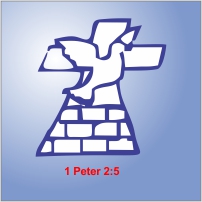AVENGER: Double Sentence
- Details
- Category: Teachings & Articles
- Published: Tuesday, 29 May 2018 13:08
- Hits: 4141
AVENGER: Double Sentence
BJMP – Balungao, Pangasinan
By Augusto A. Kho
May 28, 2018 (Monday); 10:00 am
‘An eye for an eye will only make the whole world blind.’ – Mahatma Gandhi

(picture1)
Photo from the internet
This police major called me to his office one day and asked me to cooperate with the
police operation in terms of crime prevention and reporting. Until one day, I saw one of his
subordinate who is involved in an illegal activity and immediately I reported back to him.
This police major turned out to be the mastermind until he started name-shaming me to the
entire police force under his command. We lifted him up in prayer for nearly a month until one day
he met a vehicular accident while he under the spirit of alcohol. His car was totally wrecked. While his police major-friend died on the spot, he survived but he lost his left leg. God vindicates, He is our Avenger. He still active in the service and whenever he sees me, he always extend me his hand salute- a double vindication perhaps.
Revelation 20:11-15/ NLT
“11 And I saw a great white throne and the one sitting on it. The earth and sky fled from his presence, but they found no place to hide.” 12 I saw the dead, both great and small, standing before God’s throne. And the books were opened, including the Book of Life. And the dead were judged according to what they had done, as recorded in the books. 13The sea gave up its dead, and death (thanatos) and the grave 13 and Hades 14. gave up their dead. And all were judged according to their deeds. 14Then death and the grave were thrown into the lake of fire. This lake of fire is the second death. 15And anyone whose name was not found recorded in the Book of Life was thrown into the lake of fire.”
Double sentence
Take note in verse 14 on the above-given reading.
Should someone who committed a crime will be meted with death penalty twice in his lifetime? Why would John says, “The lake of fire is the second death?”
In England, life sentence takes 30 years and if you have murdered two people then you shall be meted with 60 years life imprisonment. Presuming we have the same life sentence as an standard in the Philippines, how many years shall you serve your life sentence if you have killed 45 people?
Romy (not his real name) is a paid killer. When I asked him how many people he have gunned down and executed, he said, “ Five Star bus-full of passengers.” Five Star bus has around 45 seating capacity. Should this man have killed that much, then he should be meted with 45 life sentences which is a total of 1,350 years.
So it is possible that a man who sinned can be judged for death sentence twice as well.
Terminologies Defined
Death in Greek “thanatos” i.e.” the death of the body; separation (whether natural or violent) of the soul and the body by which the life on earth is ended; future misery in hell; nether world, the abode of the dead; conceived as very dark; it is equivalent to the region of thickest darkness; metaphorically the loss of life; miserable state of wicked dead in hell. “
Hell however is too generic but the Scriptures explained several compartments or divisions in hell (Matthew 16:18). Others vividly explained as “chained of darkness, abyss, tartaroo, etc).
Is there such as thing like “double death-sentence” in the Philippine Court? Why there is double death-sentence in God’s Court of Justice? Is it because He is a Righteous Judge?
Isaiah 33:22, “For the LORD is our judge, the LORD is our lawgiver, the LORD is our king; he will save us. “
The word “judge” in Hebrew “shaphat” (shaw-fat) means “to judge, govern, vindicate, punish; to decide a controversy; pronounce a sentence; execute; judge, reason, rule, avenge.”
Time Magazine
Time Magazine featured the newly elected President of the Philippines and made him a front cover on their magazine dubbed as “The Punisher.”
(picture2)

White Stone
The white stone given to the “remnants who had overcome” in the Church of Pergamon must be coming from the “white throne” of God.
Rev 2:17 “He that hath an ear, let him hear what the Spirit saith unto the churches; To him that overcometh will I give to eat of the hidden manna, and will give him a white stone, and in the stone a new name written, which no man knoweth saving he that receiveth it. “
“Stone” in Greek “psephos” (psayfos) i.e. “small worn smooth stone, a peeble (in ancient courts of justice the accused were condemned by black peebles and the acquitted by white); a vote (on the account of the use of peebles by voting).”
In your case, whether you are innocent or not, will you be given a white stone for acquittal?
Life and death
Proverbs 18:21, “Life and death are in the power of the tongue, and they that love it shall eat the fruit thereof.”
Jeremiah 8:3, “And death shall be chosen rather than life by all residue of them that remain of this evil family..” In other words, be it life or death, it is a choice we have to make.
Jeremiah 21:8, “And unto this people thou shalt say, Thus saith the LORD; Behold, I set before you the way of life, and the way of death. “
John 5:24, “Verily, verily, I say unto you, He that heareth my word, and believeth on him that sent me, hath everlasting life, and shall not come into condemnation; but is passed from death unto life. “
-
Heareth Greek “akouo” i.e. to be endowed with the faculty of hearing, not deaf; to attend to; to consider what is or what has been said; to perceive or understand.”
“Motion for Reconsideration,” an appeal to re-study the case
-
Believe Greek “pisteuo” i.e. to think to be true; to be persuaded to; a conviction of trust.
-
Everlasting Greek “aionios” i.e. without beginning or end; always, forever, eternal perpetual (Past time, past, and future)
-
Life Greek “zoe” i.e. the state of one who is possessed by vitality or is animate; absolute fullness of life
-
Condemnation Greek “krisis” i.e. a separation, sundering; selection or judgment; opinion or decision.
Remember “chasma,” the Greek god titan meaning a “gulf, sea,”
-
Death Greek “thanatos” i.e. “the death of the body (that separation whether natural violent of the soul and the body which the life on earth is ended); the future misery in hell and the power of death; the nether world (Orcus) which is the abode of the dead, was conceived as being very dark, it is equivalent to the region of thickest darkness enveloped in the darkness of ignorance and sin; the miserable state of the wicked dead in hell; death.”
“I am the life, no one can comes to the Father but through Me” – Jesus Christ (John 14:6)
Only those who will be given a white stone will have life in heaven (restored in the fullness of Christ due to his redemptive blood as a sacrifice on the cross) while the rest will be given a black stone for eternal condemnation in hell.
Isaiah 33:22, “For the LORD is our judge, the LORD is our lawgiver, the LORD is our king; he will save us. “
The True Avenger: the True Judge
Shall we place revenge on our hands if justice is elusive on this land? Shall we take the principle of “tooth for a tooth” if we are innocently accused?
Revenge in the Greek mythology, is the goddess of retribution called “Nemesis.”
“Dearly beloved, avenge not yourselves, but rather give place unto wrath: for it is written, Vengeance is mine; I will repay, saith the Lord. “ (Romans 12:19).
Vengeance in Greek “ekdikesis” means “avenging, vengeance, punishment, vindication, retribution.” Root word from Greek “ekdikeo” i.e. “do one justice, to punish a person for a thing; to avenge a thing, to retaliate; to vindicate.”
The true punisher is not President Duterte. He too will be soon judged as well in the same manner that all of us will be presented to the White Throne of Judgment. The true PUNISHER or AVENGER is GOD through CHRIST our LORD!
God respects the rule of law and He will never, never violates your human rights. He respects that. Greek “ekdikeo” also means “to vindicate one’s right.” God is a Human-Rights Advocate.
NOTES:
Definition of Terms
Book or books from Greek “biblion” i.e. “a small book, a scroll, a written document; a bill of divorcement..” From ancient Greek “biblos” i.e. “a roll, a scroll; a written book, scroll of writing.”
Book of Life in Greek “zoe” i.e. “life (the state of one who is possessed of vitality or is animate; of every living soul).”
Works or done in Greek “ergon” i.e. business, employment, that which one undertakes to do; an act, deed, thing done; labour; toil; work.
Death in Greek “thanatos” i.e.” the death of the body; separation (whether natural or violent) of the soul and the body by which the life on earth is ended; future misery in hell; nether world, the abode of the dead; conceived as very dark; it is equivalent to the region of thickest darkness; metaphorically the loss of life; miserable state of wicked dead in hell. “
Hell in Greek “hades” i.e. Hades or Pluto; the god of the lower region; Orcus, the nether world, the realm of the dead; later the word is used as “grave, death and hell.” (Thayer). Strong Definition: hades, place or state of departed souls; grave and hell.
Nemesis, the Avenger
In the ancient Greek religion, Nemesis also called Rhamnousia or Rhamnusia ("the goddess of Rhamnous"), was the goddess who enacted retribution against those who succumb to hubris (arrogance before the gods). Another name was Adrasteia or Adrestia, meaning "the inescapable" according to Ammianus Marcellinus.
In our visit to ancient city of Smyrna on June 12, 2017 (Monday), our lady tourist guide named Ms. Emile Meltem, a native of Smyrna (now Izmir) shared that “Pausanias, a geographer and traveller during 2nd A.D. had a relationship with Alexander the Great and shared to him his dream in Mount Pagos in front of the Temple of Nemesis. Alexander allegedly saw this deity of retribution and revenge, Nemesis in a vision.”
Capital punishment in the Philippines
It has a varied history and is currently suspended as of 2006. Capital punishment was legal after independence and increased in use under the Ferdinand Marcos regime. After the fall of Marcos, there was a moratorium on capital punishment from 1987 to 1999, followed by a resumption in executions from 1999 to 2006, and followed - in turn - by a law ending the practice.
Filipinos have mixed opinions about the death penalty, with many opposing it on religious and humanitarian grounds, while advocates see it as a way of deterring crimes.
-
Firing Squad
During Spanish colonial rule, the most common methods of execution were death by firing squad (especially for treason/military crimes, usually reserved for independence fighters) and garrotte (a notable case would be the Gomburza). Death by hanging was another popular method
A prominent example is the national hero, José Rizal, who was executed by firing squad on the morning of December 30, 1896, in the park that now bears his name.[1]
-
Electric Chair
In 1926, the electric chair (Spanish: silla eléctrica; Filipino: silya eléktrika) was introduced by the United States' colonial Insular Government,
1984-1986
The capital crimes after regaining full sovereignty in July 1946 were murder, rape and treason. However, no executions took place until April 1950,[4] when Julio Gullien was executed for attempting to assassinate President Manuel Roxas.[5] Other notable cases includes Marciál "Baby" Ama, electrocuted at the age of 16 on October 4, 1961, for murders committed while in prison for lesser charges.[6] Ama notably became the subject of the popular 1976 film, Bitayin si... Baby Ama! (Execute Baby Ama!).[7]
Reintroduction of Death Penalty
President Fidel V. Ramos promised during his campaign that he would support the re-introduction of the death penalty in response to increasing crime rates. The new law, drafted by Ramos, restored capital punishment. This law provided the use of the electric chair until the gas chamber (chosen by the government to replace electrocution) could be used.
Second suspension (2006)
.On 15 April 2006, the sentences of 1,230 death row inmates were commuted to life imprisonment, in what Amnesty International believes to be the "largest ever commutation of death sentences".[14]
Capital punishment suspended (2006)
Capital punishment was again suspended via Republic Act No. 9346, which was signed by President Arroyo on 24 June 2006. The bill followed a vote held in Congress earlier that month which overwhelmingly supported the abolition of the practice.[15] The penalties of life imprisonment and reclusion perpetua (detention of indefinite length, usually for at least 30 years) replaced the death penalty.[16]
Protocol to the International Covenant on Civil and Political Rights
The Philippines subsequently signed the Second Optional Protocol to the International Covenant on Civil and Political Rights. The Optional Protocol commits its members to the abolition of the death penalty within their borders.It was signed on 20 Sep 2006 and ratified on 20 Nov 2007.[17]
Aftermath
President Arroyo controversially pardoned many prisoners during her presidency, including a 2009 pardon for all remaining felons convicted for the 1983 assassination of former Senator and opposition leader Benigno Aquino, Jr.[19]
Support for reintroduction of capital punishment
During the 2016 election, presidential candidate and frontrunner, Davao City mayor Rodrigo Duterte, campaigned to restore the death penalty in the Philippines.[20][21][22] During the "Yes or No" segment of the second presidential debate on March 20, 2016, Duterte and Senator Grace Poe were the only candidates who said "Yes" when asked about the restoration of the death penalty in the country, favoring the decision.[23]
Duterte, who won the election in May 2016, supports restoration of the death penalty by hanging.[24] It has been reported that he wants capital punishment for criminals involved in illegal drugs, gun-for-hire syndicates and those who commit "heinous crimes" such as rape, robbery or car theft where the victim is murdered,[24] while Poe has stated that the capital punishment should apply to criminals convicted of "drugs and multiple crimes where involved people can no longer be rehabilitated."
Source: https://en.wikipedia.org/wiki/Capital_punishment_in_the_Philippine
Life imprisonment
Life imprisonment (also known as imprisonment for life, life in prison,[citation needed] a life sentence, a life term, lifelong incarceration, or life incarceration) is any sentence of imprisonment for a crime under which convicted persons are to remain in prison either for the rest of their natural life or until paroled. Crimes for which a person could receive this sentence include murder, attempted murder, conspiracy to commit murder, blasphemy,[1] terrorism, severe child abuse, rape, espionage, treason, high treason, drug dealing, drug trafficking, drug possession, human trafficking, severe cases of fraud, severe cases of financial crimes,



